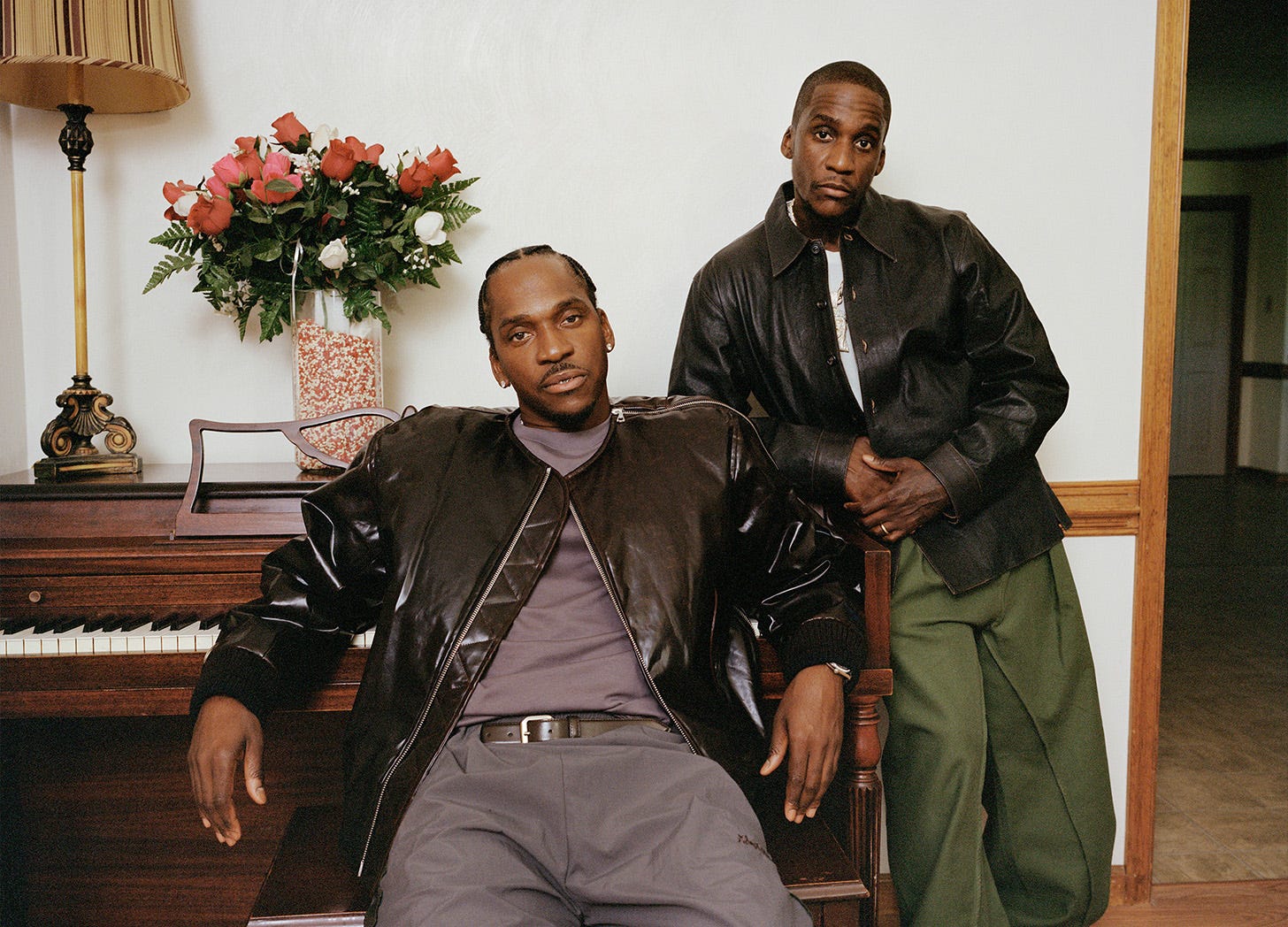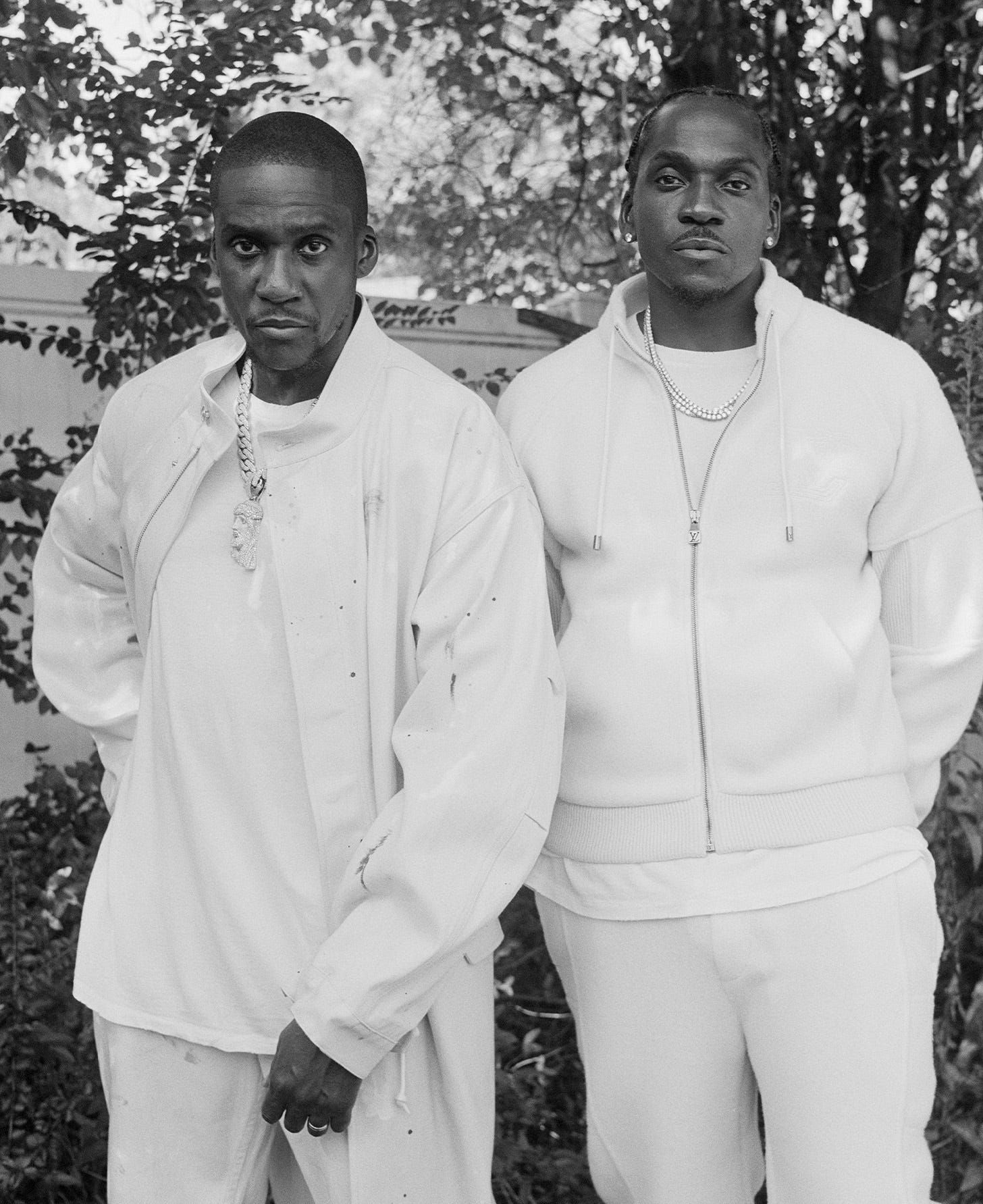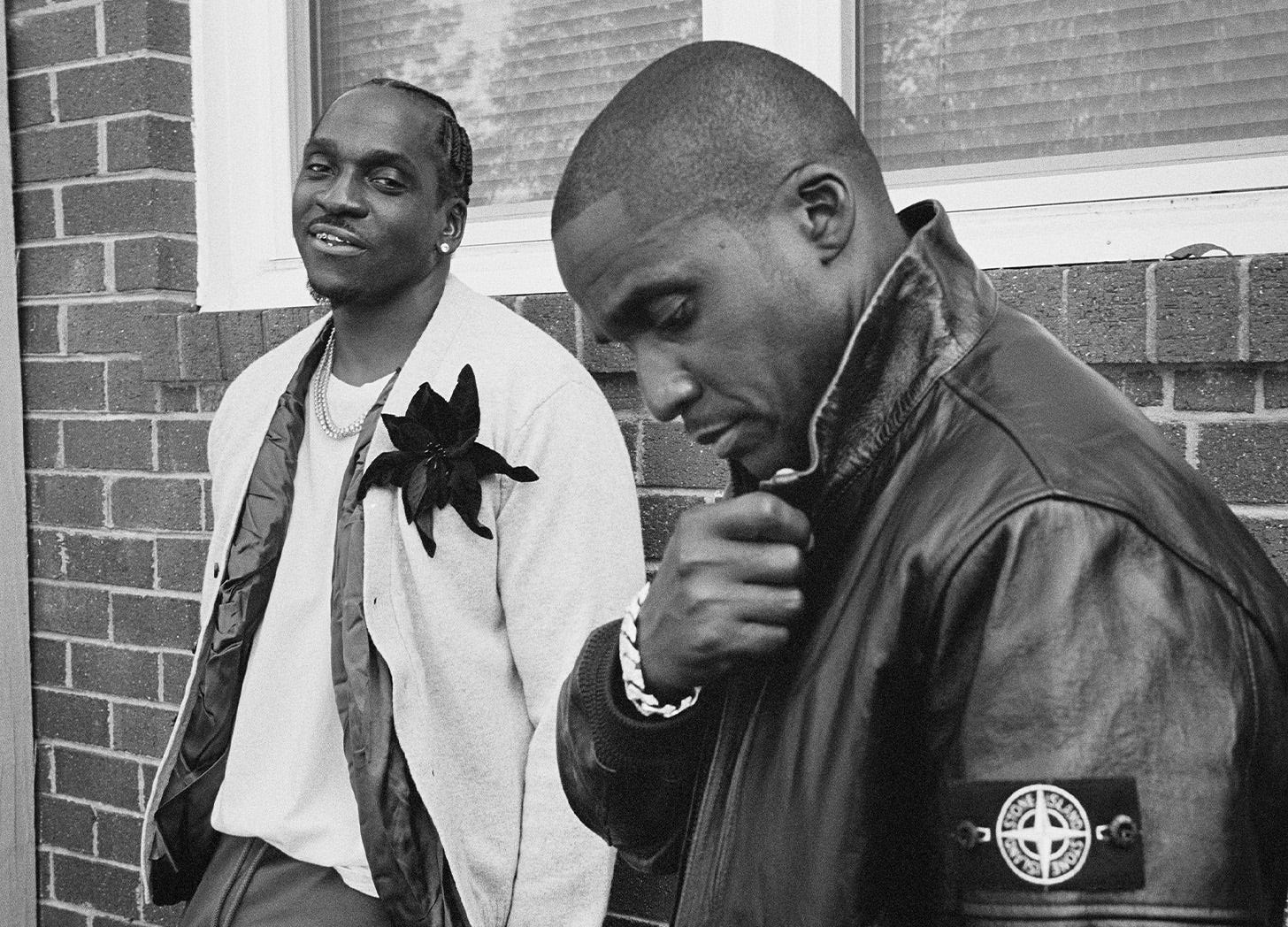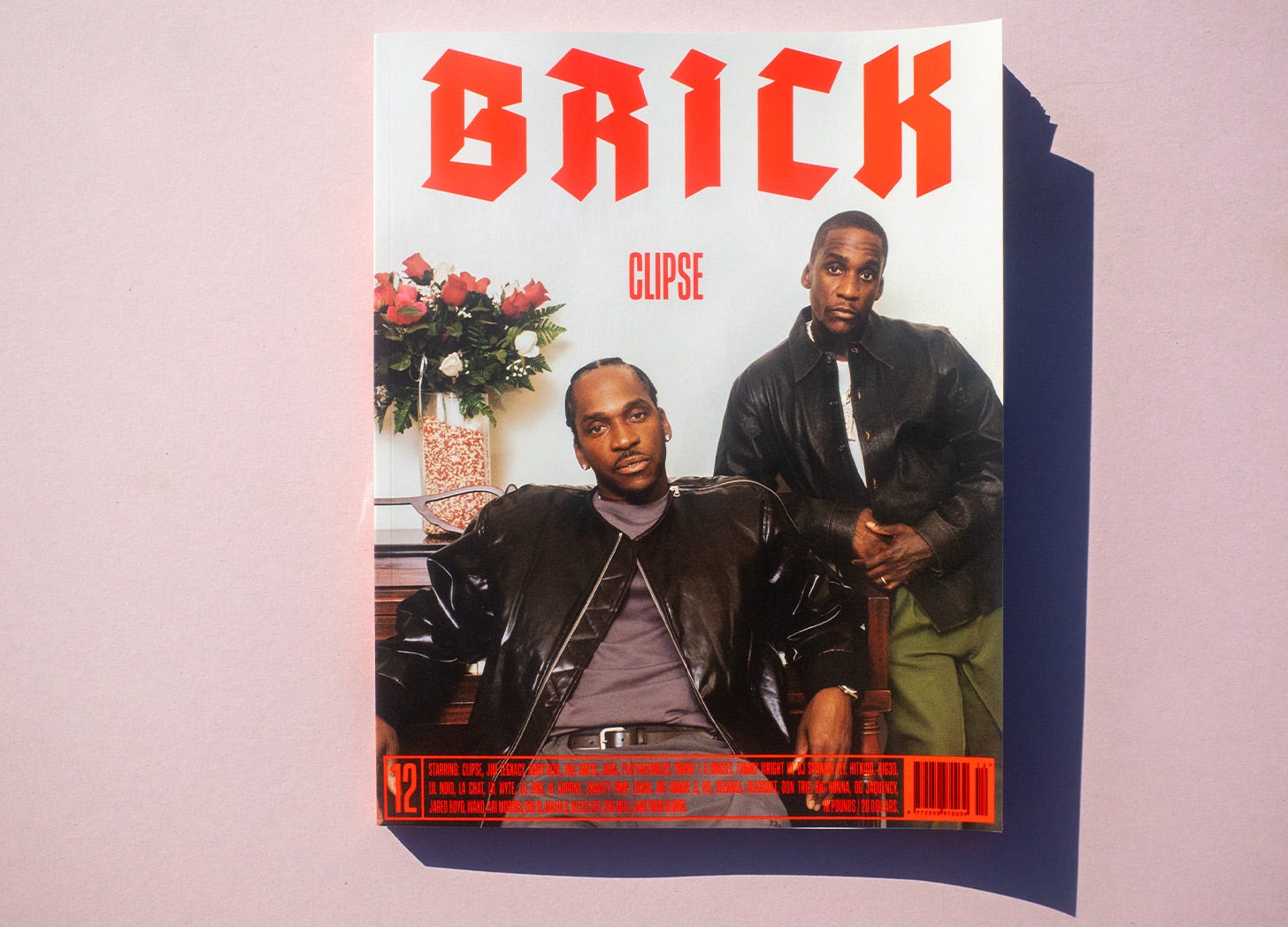Clipse: When The Last Time You Heard It Like This? (Part 2/2)
“Time is the flex. Whoever can stay the purest the longest—that is who wins. And I think that we are showing that. Time is how we are showing that we are better than everyone else.”
This is the second half of a two-part story. Click here to read Part One.
Photography by Rahim Fortune
Words by Mardean Isaac
Fashion by Marcus Paul
BRICK: During the period after you took a step back from the group, you continued writing, including a book, and your own albums, mostly with religious themes. Can you talk about those literary and religious influences?
Malice: I can honestly tell you from the very beginning of our recording records— growing up, it was something about the word of God that always spoke to me. I just didn’t necessarily believe it. But I always thought: if this were true, it’s amazing. But I didn’t always recognise it as the truth. I thought the literature was just incredible. The account of this man Jesus: you can’t take some of it, and not all of it; there’s no way you can disregard certain things. If any of it’s true, all of it must be true. It’s too profound and too relevant. I found too many principles and theories that if I had listened to, I’d have been all the more better—especially as I was navigating such a worldly lifestyle, and not knowing why I was running in circles. It speaks to my every intellect, my every being. It speaks to my everything.
BRICK: Do you do a lot of reading?
Malice: Reading is my thing, bro. That’s all I do is read, actually.
BRICK: Old books, new books?
Malice: My go to book is 100% the Bible; I’m reading that every day, without fail. Early in the morning, 3:30, 4:30—that’s what I’m reading. But I also have a crazy book collection.
BRICK: Is there a particular version of the Bible?
Malice: KJV [King James Version].
BRICK: Is it common in Virginia to read the KJV?
Malice: I think it is common among the mature Christian. There are Christians who swear by the KJV and refuse to read anything else. Some people just don’t understand the KJV; they might need it a little more plain, or laid out. It speaks to me: it’s just so poetic. It touches you, man: the wording. The way things are worded, it has to be true—just from you wording things a certain way. I love it. The different translations—to me they’re cool, but it don’t bring it home like the KJV.
BRICK: There’s something about the wording of Clipse verses that is special: it's about finding that bond between word and truth, which is clearly driven by something profound. You can’t quote Clipse lyrics any other way; it’s exactly how it’s said, and it can’t be paraphrased.
Malice: I can dig that—thank you. I see us as speaking from the heart. To me, hip-hop has to touch you—the rhymes have to touch you—in a certain way to make you feel it, and to know that a person has literally been through that, you know what I’m sayin’? You can’t manufacture it, in my opinion. And when it is manufactured, it might even be some good music, but there’s a disconnect between the storytelling and the artist. If it makes for good music, I’m not mad at it either.
BRICK: When you say you’re reading scripture at three or four in the morning, are you just that early a riser, or is that part of some ritual? Do you go back to sleep afterwards?
Malice: Absolutely no ritual. I don’t know why I wake up at that time, but that’s the time I wake up—and I feel that’s the time I am to get up and start my day. That’s the time when I have my freshest ideas; that is the time that my list of things to do for that day are very, very clear, and it lets me know how I am to execute that day. Afternoon, things start getting a little foggy to me, but first thing in the morning, it's like the clarity is just so intense. Even my mom would say the same thing. If I was working on a song and I couldn’t complete it—maybe, I guess, someone might call it a writer’s block or a mental block—all I gotta do is go to sleep, and next morning, before I even open my eyes, that line comes to me, you know what I’m sayin’? [laughs] I’m like, wow: how could I not have thought of this yesterday? But first thing in the morning [snaps fingers] that line comes right to me: it’s like a gift. And it’s been like that since the inception of Clipse, for me. It’s always been like that. I know I have to get up. If I go to sleep, I’ll overlook it; I won’t get it. So I get up to retrieve that line, ‘cuz that line be waiting for me like a gift. I dare not sleep it off.
BRICK: Push, I wanted to ask about songcraft, because you’ve had an intense solo career as an artist, but you’ve also done so many collaborations and worked on Kanye’s albums. Had your perspective, when coming back to do this record, changed after those experiences?
Pusha T: There are definite codes that you take with you. In working with a different producer in Pharrell, I think there’s a different science, though, than the Kanye science. On “It’s Almost Dry,” I showed that both worlds could coexist. There’s always been this debate of who’s better, who gives me the best, and what do you get from both. So even in constructing that album, it was more about showing: that’s a way harder decision to make than people make it [laughs]. And I think, more importantly, it showed that those two worlds of production can actually co-exist and that the Clipse, myself, we can grab greatness from each of those.
BRICK: Central to the Clipse is the younger brother-older brother dynamic: brashness versus maturity, profanity versus faith, acting on impulse versus wisdom. I feel like those dynamics actually exist within each of you as well as between you; on this record, Pusha has quite a few deeply spiritual lines, and Malice has braggadocious lines. I wonder how you guys see the brotherly dynamics of the Clipse on this album.
Malice: Like you say, I feel like we have a lot of parallels, in many ways. I feel like I’m more laid back; I know I’m a little more reserved. But given the right circumstance, I’ll kill you [all three of us laugh]. And I think that’s how Pusha, to me, and through my eyes, is a standout, flashy; just a light. Just a star. And over these past years, these recent years, I believe what I’ve witnessed is him become more reflective. And I’m not saying he’s never been reflective, but I’m just saying more visibly reflective. I see him with his family, and with his son, and I think it’s made our working space very much compatible. And it’s definitely more cohesive. But we have a lot of parallels, but we do tend to live each of us separately in the opposite spectrum of those parallels.
Pusha T: For me, some of my more introspective content is brought out by having Malice next to me. People have heard me brash and braggadocious for so long. And when you place a verse of that next to Malice saying some super real shit, that hits you—hits you differently… It’s like, man, for me, I look to that—and I look to how people get hit by things that he says, and I think: I need some of that, and I want some of that. It turns competitive. Singularly, or solo, you can say a fresh line about a car; standing next to Malice, he’s saying something that’s damn near condemning it—or something that is so real, that it’s like: the world is so much deeper than that. And it’s like: damn, it’s a hard race to keep up with at times. It’s something to be mindful of—that I’ve had to be mindful of.
BRICK: “EBITDA” is a special one in terms of all three of you rapping, but also you two trading bars. Was that a fun one to make?
Pusha T: I love “EBITDA.” I like to call it the Tribe Called Quest moment of the album [laughs]. But the Tribe Called Quest moment when Q-Tip does a song for Mobb Deep, you feel me? It’s like that. The energy we were trying to mimic, the colour; we likened it to that. Once we heard the beat we was like: oh yeah, this colour is ill, and we needed to add it. Super fun to make.
Malice: It’s always a highlight, a special moment when you get Pharrell rapping, the way he raps. A definite plus.
Pusha T: That’s a good point—getting Pharrell to rap, that energy is always good, because it takes me back to a time when rapping was all that we all cared about. It takes me closer to that time, back then, when there were no other distractions: it was only making music, it was only hearing fresh lines. And that’s what made up our day. There’s so many distractions; we all have lives, we all have something else to do. We’re all consumed. And when everybody feels like they have to be on a beat [laughs], it’s like, yup: we hit the vein on this one.
BRICK: I wanted to ask about time. One of the most powerful dimensions of the record is that you play with different these different layers of perspective: you immerse the listener in life as you once lived it, life as you live it now, and also the experience of looking back on the past from the perspective of the present, in light of everything that’s happened and how you’ve evolved as individuals and a family. Can you talk about the role of time and different perspectives offered by time, on the album?
Pusha T: Time is the flex. Whoever can stay the purest the longest—that is who wins. And I think that we’re showing that; competitively, we are showing that. Time is how we are showing that we are better than everyone else. And not trend chasing at it either. Nah: we can make reality sound fresh, and not just in a street sense—in a real life sense. I don’t think other guys have done this for this long.
Malice: Nah, they haven’t.
Pusha T: They haven’t tackled these issues or tapped into these emotions. “Birds Don’t Sing” is hard to do. I don’t know if people can just make that. Time is the flex, man. What is time? And how you navigate through time; and how you fit in, in the time? Are you still competitive in the time, or are you just existing in time? We’re not just existing; this music isn’t just existing.
Malice: I look at it like the old adage: time will tell. And over the years, and with all the time that has passed, you can look at people and tell what they have been doing with their time—and what they have not been doing with their time. We got a song called “Grace of God,” and I think it just speaks to what people can find themselves in. Not managing your time, or squandering your time—mishandling your time—it can land you in a personal hell. And we see that with indictments, and death, and drugs. And people wear what they’ve been doing on their faces, you know what I’m sayin’? And it’s the resilience of the Clipse—at our own pace, doing what we do, how we do it, always have done it. And it’s like my brother says: who can stay the purest, the longest. Slow and easy win the race!
BRICK: I wanted to ask about “Grace of God,” which for me is part of a line of epic Clipse tracks including “Nightmares” and “Life Change” which deal with fate and the moments where the consequences of actions suddenly make themselves felt. The song has a celebratory aspect to it—escaping punishment and incarceration—but also there’s pain and questioning. I’d love to hear your thoughts on the power and potency of that song in terms of your lives and journey.
Pusha T: I think the song itself is just so reflective. The hook is so strong to me. It just speaks to everything we’ve witnessed. [He slowly recites the lines of the hook, as if taken aback by their power.] “They missed this wall”—with drugs in it, luckily [laughs]. Just a lucky metaphor. It’s like, man. And it was just so cool—such a cool way to say it. A cool way to mention being lucky, but also speaking to the grace of God. I sing it the most, actually; I sing the hook the most. Again: heavy, heavy—a hard record. But not quintessentially hard. It’s so consequential—it just speaks on so many different consequences. It’s kinda what the Clipse has always been known for; speaking to all sides of the situation. Not just speaking to the glamour of it all. It’s funny you picked that song, man. I listen to it everyday, I’m on the treadmill to it everyday—but I sing it a capella all the time [laughs].
Malice: What I like about the song is how everyday decisions, consequences—even making bad decisions, I believe—well, I know—it can happen to anybody. It is not above anyone to make mistakes. But also, you have to be aware, to be observant. You have to pay attention when the fire gets too hot. You definitely have to be learning from certain mistakes. And some people choose not to—some people just want to float, and just coast, and not pay attention to the warnings you’re getting all along the way. There are warnings: you don’t just find your ass in a fire! There are tell tale signs that say: hey, you may want to rethink that. And if nothing else, it should open the mind, especially to the youth, who are out here doing what you do. We may understand what you’re doing, and why you’re doing it, but pay attention. One of my good friends Iceman always says: Gene, sin feels good, but is it friend or foe? And you gotta ask yourself these kinds of questions, and just open your mind; open your eyes.
BRICK: There are quite a few references on the album to the events of 15 years ago—I believe it was actually April 2009, eight months before your last album [Til the Casket Drops] came out—when your people were taken away. I wonder about the legacy of those events, especially in light of time passing, kids being born and growing up, perhaps some of the guys actually being released, and whether making this album marks some kind of landmark that in some way connects to those people who came up in the music game alongside you?
Pusha T: I don’t think so. We’ve spoken about situations and instances and energy within that time. But that wasn’t even the realest times of our lives, I think that’s what we’ve proved [laughs]. That was a time. It was a time. But life goes on; life really goes on. And I feel like it speaks to those losses that were taken, whether in time, whether in friendships—any of the losses taken during that time. We bounced back from ‘em all. As Gene said earlier, it’s about the resilience. That life wasn’t even the end all, be all.
BRICK: Another powerful dimension to the Clipse is that the group simultaneously represents a deeply local narrative, a deeply American narrative, and also a global one. I’ve heard Push speak about connections in Germany; I know he’s been coming to London since the late 90s; you guys are connected to Japan as well. So I wanted to ask about the international vision in relation to this phase of the Clipse.
Pusha T: International has always been such a big deal for us; we’ve always been moving around internationally as a group. We were one of the first hip-hop groups on the European festival circuit, with this level of content. International we’ve always looked at it as a must. It’s never just been here in the States that we only cared about—because we’ve gotten so much love in those other places. And that has a lot to do with doing those European runs; European press; Japan; and so on and so forth, as well as the fashion side of it. People in those places relate to it. I just left India. We’re looking to engage everywhere; we’re looking to be out here and really run the circuit, wherever Clipse fans are, we want to see them all. Hip-hop is so large that I feel like, between the music itself, and the internet, everywhere is across the street. Nothing is far anymore.
BRICK: Pharrell’s Louis Vuitton shows in Paris have both featured new music from you guys, with “Chains and Whips” last year and “Birds Don’t Sing” this year. Can you talk about your experiences of those shows and what it was like to have the songs featured there?
Pusha T: The experience was amazing. What I think the Clipse represents is the intersection of culture and music. Street culture, fashion: 360° of hip-hop. That’s the only way you can exist in this thing today, to me. Incorporating the music and the high fashion and just creating that world around us that we’ve been in since ’01-’02: the intersection of streetwear culture, high fashion; the influence in all of those worlds and how the music brings all of those worlds together. It’s a moment of putting a stamp, like: yes, we have been part of hip-hop culture, fashion in all aspects. We don’t just rap about it; we actually really live it—we’ve been influential in all these spaces all before. We’re walking the show—but we were talking and buying Pucci years ago. We were actually doing it and wearing it; and it was high end. Whether it was BAPE or Japanese denim, we’ve always been entrenched in that. And our fans followed us because of these things as well; it actually broadened our fan base. The way we articulated ourselves, in those worlds, on the music, it opened us up to more fans, I believe. So it’s just a full circle moment to be able to walk in these shows and have the music debut there. Man, that “Chains and Whips” rang off; people knew. They was like “Oh my God” [laughs]. I love watching that one, ‘cuz it’s like: you watchin’ Hov make a face as he’s listening to these raps, he’s like: ah man this is crazy! Co-sign without the co-sign.
BRICK: While sitting next to Bernard Arnault as well.
Pusha T: Mm-hmm. Awesome.
BRICK: There are many interconnected narratives with Clipse and fashion; we can mention names from Nigo to Jerry Lorenzo. But I wanted to focus on LV, which is a story in itself, and a growing one, as a brand that has gradually incorporated Clipse aesthetics and language: Virgil embracing Pyrex Vision and Off White as terms and using tracks from Hell Hath No Fury in his playlists, and now of course Pharrell becoming creative director of the brand and Push becoming a house ambassador there. I wanted to ask about Clipse’s role in the transition from streetwear to luxury, what it means to you guys, and what your hopes are for developing it even further?
Pusha T: The transition is a ping-pong. I don’t think you ever stop wearing streetwear, or luxury—or mixing the two. That’s what people need to see. I’m watching how people are taking specifically my ambassadorship over at LV—and they want to see it worn. They can see it on the runway, but they need a tutorial, through me, to the streets, you know what I’m sayin’? You don’t wear everything like a runway show. And it’s dope to see how it translates to the streets. And I think that’s my goal in it for sure. That’s what we aim to do in doing it.
Malice: The music and fashion will forever be intertwined. Those who come up behind us in this artform, I hope to give them an idea of how it can be done. You don’t have to burnout, and you don’t have to compromise. It’s a way to do it, and the level that we do it on, you don’t see this often. I would even go so far as to say you don’t see it at all, if you ask me. Maybe one or two of the greats. But you don’t have to put an age on this. It’s just: are you good at what you do? Are you into what you do? Do you have something to offer? As long as you do, and you leave a good carbon print on this world, you’ll always be relevant. And I just want to show others, this is how it is to be done, and how it can look—and still be in competition, and count.
BRICK: On this album, you guys wrestle with the darkest and most violent and tragic aspects of life, but you sound like you’re having so much fun putting words together, especially as brothers. I wonder if you could reflect on that dynamic, between the darkness of the subject matter and the joy of creating art.
Pusha T: I think that’s the new goal—to be creative in that space. We do dark music—dark-themed music—but it’s about how creative you can make it. How articulate you can still be; how fundamentally hip-hop and lyrical you can still be, without being repetitive. Especially in today’s climate, we put ourselves under a scrutiny that is like none other. We could be cheap all day long; we just couldn’t live with ourselves [laughs]. But we could do it. Just trying to make it better—more creative, more colourful—that’s a big thing for us. The first thought is never the one; it’s always the fifth. And trying to compare your discography with the greats. Creating the movie. I think B.I.G. was very good at that. It’s all movie time now.
This story was originally published in BRICK Edition 12, released in 2025.
Edition 12 also features Navy Blue, Jim Legxacy, Tommy Wright III, DJ Spanish Fly, Nia Smith, JOBA, and many more.
Click here to purchase the issue from our store,
or join our paid tier on Substack to receive a free copy as your welcome gift.









